The outbreak of Covid-19 hit the pause button in China as the whole country pursued a strict quarantine solution to their epidemic ills. Many small traders were hit hard by this pause; Wu Pengfei is one of them.

Photo: Wu Rong
By WU Rong
Wu rents a booth in the Thirteen Factories market in Guangzhou. Before Spring Festival, he spent hundreds of thousands yuan on spring clothing, which is now out of season. As summer approaches, people start preparing for fall and winter.
The Thirteen Factories got its name from factories near the Pearl River which hosted foreign traders during the Qing Dynasty (1644-1912). The city of Canton, or Guangzhou, was the only one allowed to trade with foreigners from 1757 to 1842. Now it is one of the largest clothes wholesale markets in China.
Markets in Guangzhou traditionally resume work after Lantern Festival each year, February 8 in this case. But we all know what was going on across China by then. The clothes markets only began to reopen on March 5, with the Thirteen Factories among the earliest. But for Wu, it was not early enough.
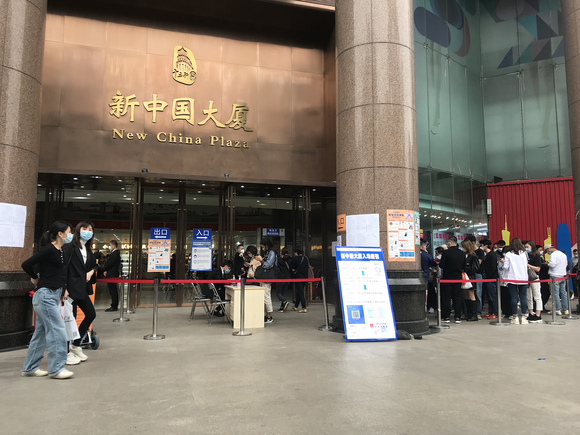
The spring sales peak comes from February to April each year. As the market was closed for a month and shoppers have become a mere trickle, Wu may have lost more than a third of his spring sales and he needs to somehow recoup funds for next season.
But now, like many other tenants in the market, Wu has something else to worry about. Since they haven’t been able to trade, the tenants expected the property manager to waive at least part of their rents.
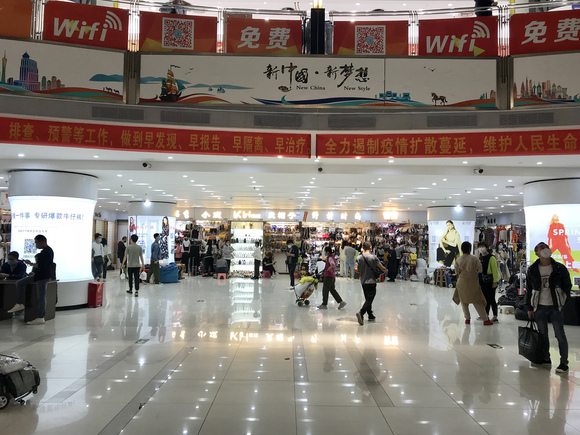
There are some 6,000 booths crammed into the Thirteen Factories which runs alongside Shisanghang Road in Liwan District. Among the buildings, New China Plaza is the biggest and most famous, which means it is the most expansive. It is also home to Wu’s booth. He said rents of booths in the plaza ranged from 60,000 yuan (US$8,500) to 300,000 yuan per month, according to the size of the booth.
The management of the plaza took measures to waive rents when it first reopened, but that was not for people like Wu who didn’t rent booths directly from the building manager, but for the official tenants only.
Zhong Dongying, a consultant for Thirteen Factories traders, said New China Plaza offers people a five-year contract. Many who rented booths from the property manager didn’t do business themselves, instead, they renovated the booths and divided them into smaller booths and rented them out to people like Wu.
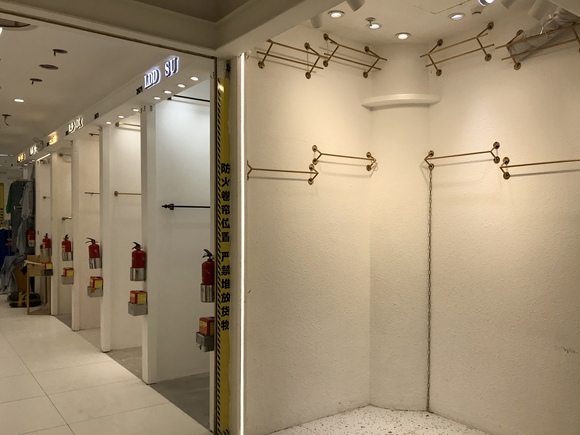
“Some of the so called booths are a space of two tiles covering no more than one square meter,” said Wu. “Yet the monthly rent of such narrow spaces is at least 60,000 yuan. People pay the middlemen a deposit of two or three months’ rent.”
Wu tried to talk to his landlord, who is actually a middleman, but who rented the booth from another middleman, but the negotiation went nowhere. Other tenants faced the same problem. The middlemen either told them to wait or referred them to the building managers. Some simply disappeared.
Anxious traders formed WeChat groups to discuss a way out. They argued that their rent in February should be waived and the next two months halved.
The building managers issued a statement on March 8, offering help for tenants to get back on track. Another statement was issued to pacify agitated tenants on March 17, promising the measures will benefit those who are actually doing business in the building.
Wu told Jiemian News that some of the tenants had received refunds but others hadn’t.
“Some booths have changed hands several times and there can be a whole posse of middlemen for one booth,” said Wu. “And the tenant only gets the money when all of them agree.”
Clothes wholesale markets sprung up in early 1990s. At first, they were simply large gatherings of street stalls. As the industry grew, merchants moved into buildings and regulations were established.
In its prime, the Thirteen Factories saw 100,000 visitors a day, with over a thousand of tons of goods passing through its doors, from all over the country. At the time, people used to say 80 percent of clothes in China came from Guangdong Province, 80 percent of Guangdong came from Guangzhou and 80 percent of that went through the Thirteen Factories.
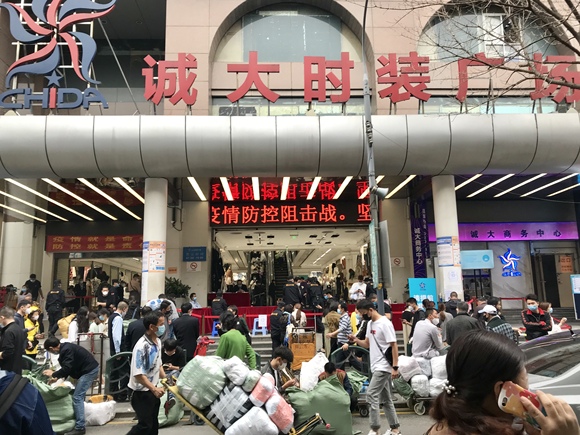
The past few years have seen a major decline in business. Apart from high rents, these markets have already had their day for other reasons. Wu feels the market started to collapse in 2014 when the blowout growth of e-commerce took hold.
“Clothes shops were hit hard,” said Wu. “And we felt the effects.” Around a third of the Thirteen Factories customers were lost to online shops.
E-commerce broke the chain between factories and retailers. Now retailers go directly to factories for a better deal and the wholesalers have lost their main revenue stream.
To cap that, most wholesale markets were located in core business areas or close to traffic hubs. These once advantageous sites are now the markets’ Achilles' heels. The price of land in these locations has risen sharply and rents along with them, to the extent that people say it is better to speculate in booths than to sell clothes.
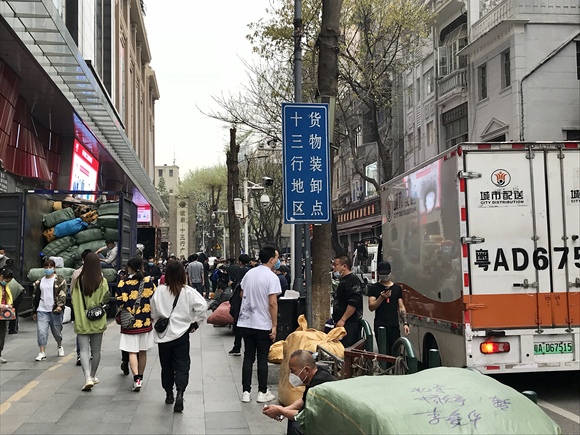
Huang Xiaoqin, a buyer familiar with many local clothes markets, believes the homogenization of the markets had made them less competitive. She took the Thirteen Factories and Shahe as examples. The clothes in both target bottom-end customers. There is hardly anything original on sale, and the merchants copy designs from one another or bigger brands until a new trend comes along.
The markets are struggling to change. The easiest way is to embrace e-commerce, but that brings its own problems. A pet phrase the merchants in the markets bandy about is “face death if not change at all, face death quicker if you try e-commerce.”
Wu said some of the merchants in the Thirteen Factories can still muddle along. Those who want a change often find that they don’t have enough money to start again.
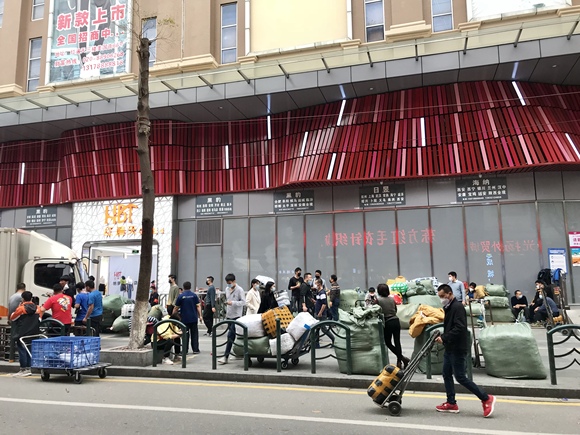
One popular way to sell goods in China now is to livestream on social media platforms such as Douyin. But there are costs involved. One has to pay the platforms and the platforms also charge commission. Then the streamers often have to buy bots and advertise themselves, which can cost a fortune.
“It takes two or three years to become trendy online,” said Wu. “Many bail out before that because of the huge cost involved.”
The concept of wanghong (“online celebrity”) is another one which the Thirteen Factories has failed to grasp.
“Hangzhou is doing a better job than Guangzhou,” Huang said. “Most of the top online celebrities are from Zhejiang or Shanghai.”
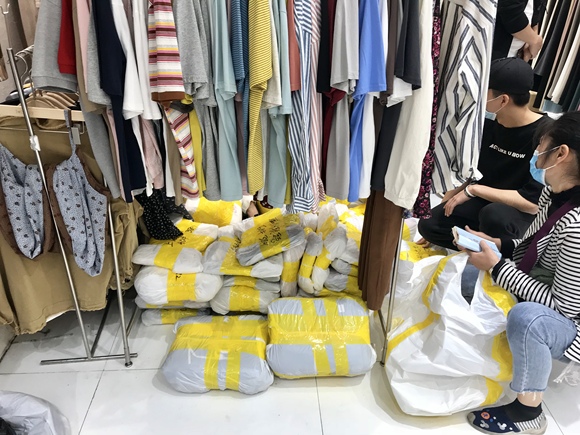
Sijiqing Clothes Market in Hangzhou now sells about 60 percent of its goods online. The wanghong have made the clothes popular. Being a celebrity means creating fashion, not following it, but Guangzhou doesn’t have good wanghong incubators, Huang said.
When Sijiqing reopened on March 10, according to Lin YuSheng, who has a booth in the market, over 50 new streamers and wanghong were live-streaming on Taobao that day.
The Thirteen Factories are planning to do something similar on March 28, but merchants like Wu are not in the mood to shift their business model now. They just want the market to return to normal.
Wu sometimes dwells on the past glory of the Thirteen Factories when the market was filled with different accents. “I don’t know if they will finally decide to move to the outskirts of the city,” he said despondently, “or if the internet will just take over.”